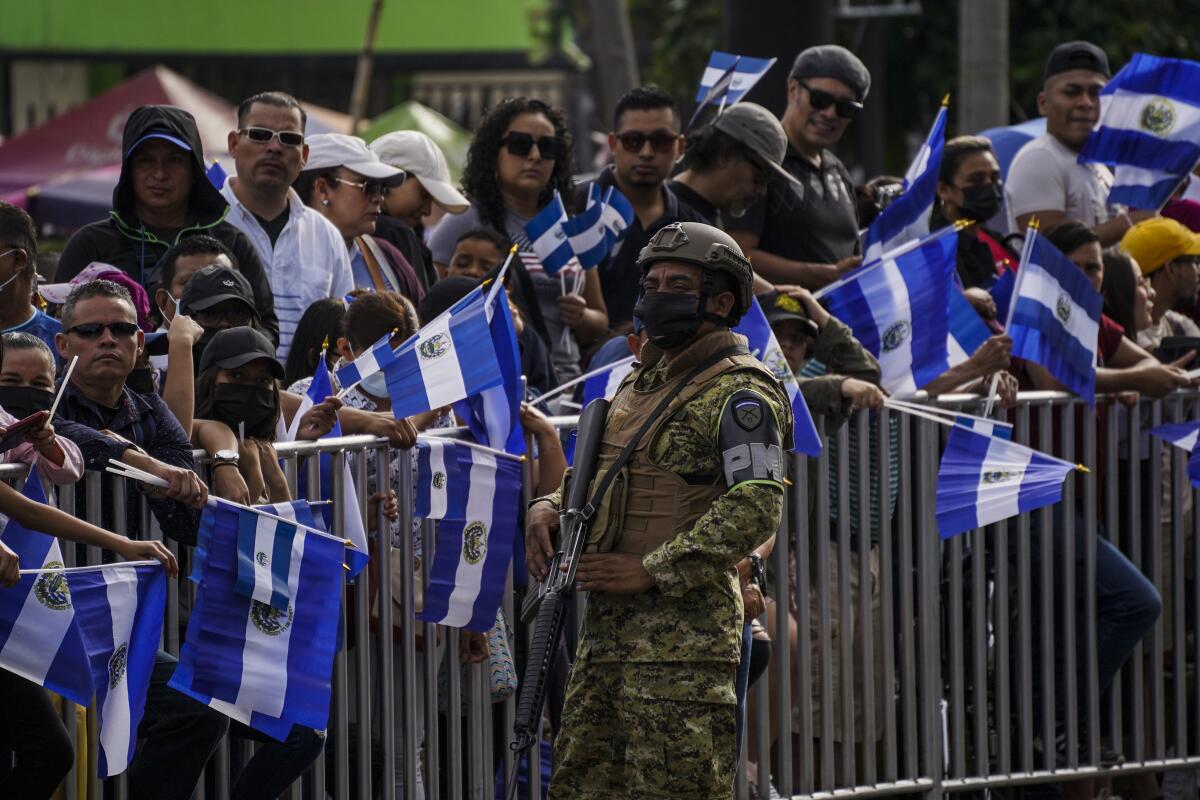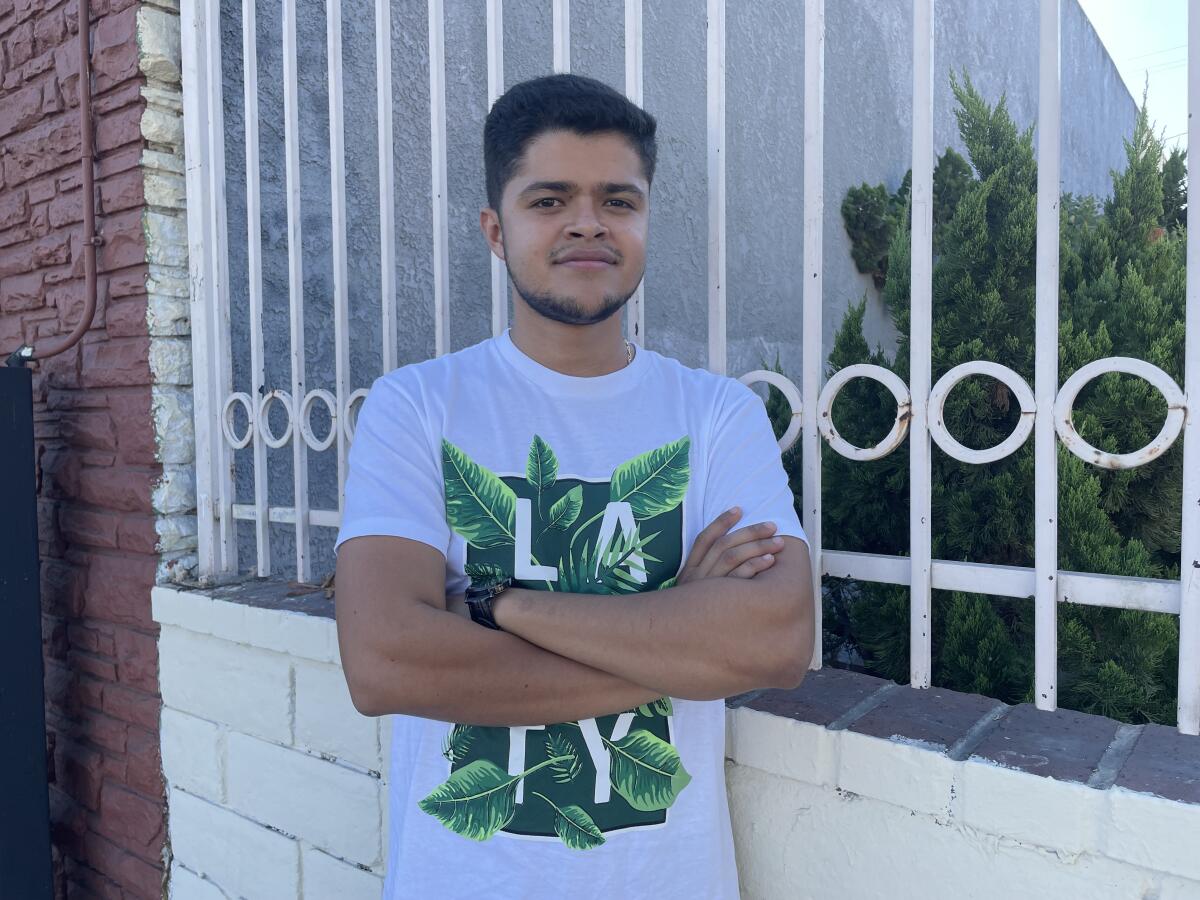El Salvador President Bukele’s reelection bid stokes L.A. immigrants’ fears of new civil war

- Share via
Digging into a bowl of chips and salsa at a Salvadoran restaurant on Vermont Avenue, Kevin Rivas shared his memories of the prison where he became intimately acquainted with pain, humiliation and impotent fury.
He recalled the pepper sprayings. The multiple baton blows to his ribs. The scrapes and nicks as his head was shaved. The dehumanizing mug shot.
“These photos are taken of us to make us look bad,” said Rivas, 26, as his father shared a harrowing police photo of his bald-headed son, who was detained in April and, for three days, locked up in the notorious La Esperanza prison, better known as Mariona, on the northern outskirts of El Salvador’s capital, San Salvador.
“It hurt me to my soul,” said Rivas, who immigrated to Los Angeles in early September.
An audiovisual producer by trade, Rivas is among hundreds of Salvadorans rounded up and roughed up by the government of Nayib Bukele, who became president of the Central American nation in 2019 vowing to crack down on murderous drug cartels and street crime.

Violent crime has dipped dramatically since Bukele ordered a “state of exception” in March. “It would seem incredible, but thank God, [we have] another day without homicides in our entire country,” Bukele wrote on Twitter on July 21. “El Salvador, which a few years ago was the most dangerous country in the world, [is] on its way to being the safest country in Latin America.”
But his administration’s tactics have been criticized by media outlets, human rights groups and foreign governments for sweeping up thousands of innocent citizens along with hardened MS-13 members. More than 50,000 people have been detained, many for nothing more than having tattoos, running from the police or simply being poor. Some critics allege that Bukele cut deals with gangs to curb their killings in return for better treatment of incarcerated cartel leaders. Investigations by the country’s few remaining independent media outlets have been stymied by the government.
A number of those like Rivas who’ve been driven to flee the country are sharing their stories, partly as a warning about what might happen if the president succeeds in his bid to run for reelection in 2024. Opponents say that the move, which Bukele announced in a Sept. 15 televised address, violates El Salvador’s constitution and would allow the president to tighten his authoritarian grip and demolish what’s left of the constitution, separation of powers and the rule of law.
Some fear that El Salvador is replicating the oppressive conditions that touched off its brutal 12-year civil war (1980-92) between leftist guerrillas and the U.S.-backed right-wing military government. That conflict cost 75,000 lives, torched the economy and brought hundreds of thousands of refugees to places such as Los Angeles, Houston, the Bay Area and metropolitan Washington, D.C.
“Reelection seems totally crazy to me,” Rivas said.
But reelection is a very popular idea not only in crime-weary El Salvador, where Bukele’s approval ratings have never fallen below 80%, but among the estimated 2.3 million Salvador Americans living in the United States, which includes 421,000 in Los Angeles County. Tensions from the homeland spilled into L.A. earlier this year when a large faction of Bukele supporters demonstrated at MacArthur Park. Police intervened to keep them apart from a much smaller anti-Bukele contingent. Supporters and opponents of Bukele also squared off in June when the Summit of the Americas was held in downtown L.A.
“It smells like Venezuela, like a bunch of dictatorships,” Rivas said. “He is going to want to stay in power, he is going to change the laws so that he follows, until we have to repeat the same story again with another insurrection.”
Among Salvadorans in Southern California, Bukele fans appear to greatly outnumber Bukele foes. Organizations such as Salvadorans Abroad, which has branches in the United States, Mexico, Central America, Canada, Europe, Asia and Australia, have voiced their support for Bukele’s tough-on-crime, so-called mano dura approach, and blame resistance to it on radical leftists and corrupt elites.
But other Salvadorans living in Southern California share Rivas’ fear that their homeland is slouching toward another violent upheaval.
Edith Anaya, 40, an activist and forensic doctor, compares the current sociopolitical environment to the late 1970s, when political opposition was crushed and right-wing paramilitary “death squads” began to carry out assassinations and “disappearances.”
“For me, since May 2021 the constitutional order was broken, from that day his dictatorship was established, when he took control of the three powers of the State,” Anaya said of Bukele.
Before settling in San Francisco in November 2020, Anaya used her Twitter account to raise questions about the Bukele government. But her critical comments provoked blowback at the state institution where she worked, she said. Her fear shot up when she noticed suspicious vehicles cruising her home.
“It was mental stress. I didn’t feel safe,” she said.
These incidents stirred up memories of her father, Herbert Anaya Sanabria, a human rights advocate who was murdered by the death squads in 1987, said Anaya, who was orphaned at age 5. “I don’t want my children to suffer the same as we did when we were little.”
“He reminds me of Maximiliano Hernández Martínez, who was the last to trample on the constitution to perpetuate himself in power, 12 years of absolute power,” Anaya said of the former president.
Superficially, Bukele bears little resemblance to the general, a staunch anti-communist who dominated El Salvador a century ago and, in 1932, perpetrated an infamous massacre of possibly as many as 50,000 Indigenous peasants. He also sought to prolong his influence by helping a loyalist succeed him.
Héctor Lindo, professor emeritus of history at Fordham University, said that the general established a newspaper that he used to issue propaganda and build his personal mythos that authoritarian rule is more efficient than democracy. But the mano dura approach “is counterproductive and delays the possibility of making genuine changes rooted in the country’s problems,” Lindo said.
Bukele’s communication platform of choice is Twitter, to which he has a Trumpian addiction. A 41-year-old former businessman, Bukele cultivates the persona of a fearless maverick who wears baseball caps backward, promotes bitcoin and punches back at his critics, including the Biden administration. His New Ideas party has ruled virtually unchallenged since it took control of El Salvador’s congress on May 1, 2021. Last month he lashed out at detractors, including 21 ex-presidents of Latin American countries and Spain who denounced his reelection scheme, condemning them as “plunderers” and “assassins.”
As Bukele has consolidated power, emigration from his country has swelled. In 2021, the U.S. Customs and Border Protection reported that 98,690 Salvadorans were detained at the southern border while trying to enter the United States, an average of 270 apprehensions per day. In the first 11 months of fiscal year 2022, Customs and Border Protection has reported 90,774 Salvadorans detained.
Elizabeth Kennedy, a specialist for Central America at the Washington Office on Latin America who has studied migration from El Salvador and Honduras since 2014, said that the Bukele government has not focused on combating structural problems at the root of mass migration. Instead, its policies have increased poverty, insecurity and social marginalization, spurring more people to leave.
“Poor people, who are the majority, would say that they are the same or worse than before” under Bukele, Kennedy said.
Those conditions caused the 25-year-old nephew of Bartolomé Pérez, who lives in Los Angeles, to flee El Salvador with his wife and 5-year-old daughter after they became victims of gang crime.
“They broke into his house, they stole the appliances he had,” said Pérez, who came to California in 1990 fleeing the civil war. “They were scared and did not want to return to that place.”
After being detained at the border for a week, the young man and his family made it to Houston in June. “The only option left for him was to go out and risk his life,” his uncle said.
More to Read
Sign up for Essential California
The most important California stories and recommendations in your inbox every morning.
You may occasionally receive promotional content from the Los Angeles Times.











